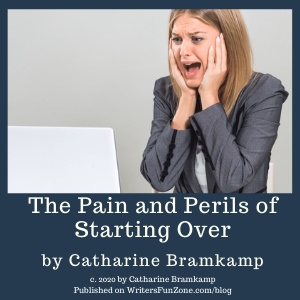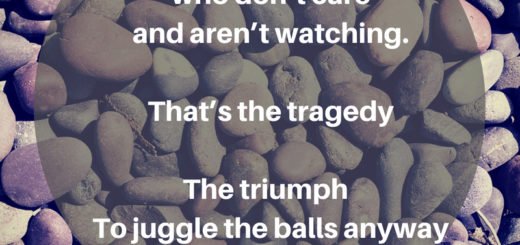The Pain and Perils of Starting Over by Catharine Bramkamp
 Let’s welcome back monthly columnist Catharine Bramkamp as she shares with us “The Pain and Perils of Starting Over.” Enjoy!
Let’s welcome back monthly columnist Catharine Bramkamp as she shares with us “The Pain and Perils of Starting Over.” Enjoy!
***
Who hasn’t had nightmares of losing their work?
A friend reported that due to a bug (we hope it’s not a feature), the most recent sixteen hours investment creating his symphony had disappeared with no hope of recovery.
Clients have watched in horror as novels are swallowed whole.
I once lost a just-completed workbook into the black maw of cyberspace where no one hears you scream.
What do you do when you’ve lost weeks, months, years of work?
First, scream anyway, cry and bang your head on the offending laptop.
Next, scream and beat the offending laptop against the floor.
Call a friend, then scream that they just don’t understand. Because what they asked, after your rant, was, why not just start over?
After a couple of gin and tonics, you wake to the painful realization that the only course of action is to start over.
STARTING OVER
You don’t have to like it, but starting a project over does have creative benefits.
The first benefit is time.
For creatives, time is our friend. Even a few days of distance helps us refine our work.
Returning to the project after a few days away, or in this scenario, return to the project because you must, carries the benefit of maturity, even if you are merely a few hours older.
What may happen upon the mature return:
- You actually find the PPT template you thought lost.
- You discover the exact right musical beat that days prior had eluded you.
- You discover a new voice from an old or marginalized character.
The second benefit is new energy for an old project.
Returning has a different vibe than starting.
Upon reconsideration, the work can either become more important or actually less so for being lost.
Since you and your work survived the ultimate disaster, it may be easier to view the remains with a more critical eye.
The next iteration is almost always stronger, better and able to leap tall agents in a single bound.
How can you gain both benefits without all the pain and anguish of loss?
Can we generate the energy and maturity of loss without all the angst, teeth gnashing, and potential alienation of friends?
While we artists don’t purposefully lose our work, we do tend to abandon it for long periods of time.
That abandonment has a purpose, it’s like loss.
We often return to something we wrote last year and think, yes this can be saved, and we edit. Or we think, no, better leave it in its dark place in my files where it belongs.
There is research on creativity that validates our tendency to start a project well ahead of deadline, then return to that project right before the deadline to modify, edit, and in some cases, start again.
The deadline helps focus our work
The deadline helps focus our work. Even if you don’t have a deadline for your work, you can create one.
Pick a time and day you want the project finished and write it down, create the work with that deadline looming.
Invest the deadline with gravitas and urgency. You must do it, so your focus will become sharp and clear.
And what about the time between starting and (at last) finishing a project? It is time well spent offering up ideas, new materials, and rest.
The Muse is ready to help
The Muse is ready to help, you just need to give her the opportunity.
In the rest stage of a project, often the exact material you need pops up on your newsfeed. Or a conversation triggers a new way to look at the novel. Or a client calls and offers up a better story for your book.
If this is how your Muse works, how your process progresses, allow it to happen.
Don’t erase or lose your first draft, but do find a way to give it a rest.
- Is there a new project you can work on while the current one rests for a couple weeks?
- Can you take a vacation between the novel’s first and second draft?
- Can you take up another art form and practice that for a week or two?
- Or do you bang your head on the laptop and spend the trip money on a new computer?
The Muse doesn’t care how you create distance and time for your book, just do it, or actually, give it a rest.
Want help with starting up your book?
Then come to our “Business to Book” workshops in Sonoma County Wine Country: https://www.sonomahealingpress.com
Already have your book in hand but need to promote it?
Everything you need to know to effectively promote your book both before and after it’s published: https://story-university.teachable.com
***
ABOUT THE AUTHOR
 Catharine Bramkamp is the co-producer of Newbie Writers Podcast that focuses on newer writers and their concerns. She is a successful writing coach, Chief Storytelling Officer, and author of a dozen books including the Real Estate Diva Mysteries series, and The Future Girls series. She holds two degrees in English and is an adjunct university professor. After fracturing her wrist, she has figured out there is very little she is able to do with one hand tied behind her back.
Catharine Bramkamp is the co-producer of Newbie Writers Podcast that focuses on newer writers and their concerns. She is a successful writing coach, Chief Storytelling Officer, and author of a dozen books including the Real Estate Diva Mysteries series, and The Future Girls series. She holds two degrees in English and is an adjunct university professor. After fracturing her wrist, she has figured out there is very little she is able to do with one hand tied behind her back.





